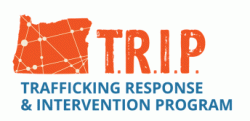|
Human Trafficking Train-The-Trainer Workshop Series |
Welcome, workshop attendees!
We are excited to have you join our group of facilitators who are delivering the Understanding and Addressing Sex Trafficking (UAST) training around the state. This new, Oregon-specific curriculum builds awareness and gives community groups and service providers specific calls to action to end sex trafficking.
After completing this series, you will have the tools, skills, and confidence to deliver the curriculum for your agency or community.
Your experience is important to us. Please let us know if you have questions, or if there is anything we can do to support your participation in this workshop series.
Letetia Wilson
Letetia.wilson@doj.oregon.gov
503-378-6881
Participant Resources:
- Course Description – English
Course Description – Spanish - Meet the Team – English
Meet the Team – Spanish
| Return to top |
Schedule
September 26, 2023, 10:00am-12:00pm. Join ZoomGov Meeting
Demonstration of Understanding and Addressing Sex Trafficking (UAST) in Our Community
September 28, 2022, 10:00am-12:00pm. Join ZoomGov Meeting
Unpacking the UAST
October 3, 2023, 10:00am-12:00pm. Join ZoomGov Meeting
When Media Goes Bad
October 5, 2023, 10:00am-12:00pm. Join ZoomGov Meeting
Navigating Difficult Questions
October 12, 2023, 10:00am-12:00pm. Join ZoomGov Meeting
Knowing Your Learner
September 26 – October 25, 2023
Independent Work
October 26, 2023, 10:00am-12:00pm. Join ZoomGov Meeting
Next Steps to Delivering UAST in Your Community
Optional Office Hours after each session on the Zoom link.
| Return to top |
Before We Begin
We are glad you can join us for the Human Trafficking Train-the-Trainer Workshop. Before we begin, please take time to complete the following tasks.
| Create a Workday Learning Account. Please note that you will need to have a Workday Learning account (English / Spanish) to access the curriculum materials. |
|
| Get to know more about this training series. Read the course description (English / Spanish) and learn more about our team of instructors (English / Spanish) |
|
| Learn more about the independent work. Read over the independent assignment instructions (English / Spanish) |
Workshop Information
Session 1: Demonstration of UAST in Our Community
Slide deck English / Slide deck Spanish
Session 1 Supplemental Information
Session 2: Unpacking the UAST
Slide deck English / Slide deck Spanish
Session 2 Supplemental Information
Session 3: When Media Goes Bad
Slide deck English / Slide deck Spanish
Session 3 Supplemental Information
Session 4: Navigating Hard Questions
Slide deck English / Slide deck Spanish
Session 4 Supplemental Information
Session 5: Knowing Your Learner
Slide deck English / Slide deck Spanish
Session 5 Supplemental Information
Session 6: Next Steps to Delivering UAST in Your Community
Slide deck English / Slide deck Spanish
Session 6 Supplemental Information
| Return to top |
Independent Work
You will complete one assignment as a part of this series. The assignment allows you to apply what you are learning as well as practice delivering Understanding and Addressing Sex Trafficking in Our Community.
Assignment: Deliver the Curriculum
Independently or with a partner, select one module from the UAST curriculum to use to practice your facilitation skills. You select the audience and delivery method (in-person or online). We can help you with finding a partner and/or audience members, setting up a Zoom link for you to use, and/or giving technical support for using the tools available in Zoom when delivering the training online.
Estimated time to complete: 60-90 minutes.
Complete by October 25, 2023.
Assignment Instructions –(English / Spanish)
| Return to top |
The Curriculum
Understanding and Addressing Sex Trafficking in Our Community
This new, Oregon-specific introductory sex trafficking curriculum builds awareness and gives community groups and service providers specific calls to action.
The curriculum includes stories from trafficking survivors through videos from The Life Story » to highlight the risks, vulnerabilities, and impact of sex trafficking.
You will customize the curriculum based on your community’s efforts, the requesting audience, amount of time available, and the delivery method (in-person versus virtual).
For access to the facilitator’s guide, slide deck, and handouts, visit Workday Learning. Please note that you will need to have a Workday Learning account and take part in the Train-the-Trainer series to access these materials.
Participants will receive a hard copy of the facilitator’s guide in the mail.
| Return to top |
Supplemental Information
Session 1 Supplemental Information
- T.R.I.P
- Socio-ecological Model
- Rebecca Bender
- Elevate Academy
- The Life Story
- Dignity Health PEARR tool
- Workday Learning New User Guide
- HEAL Trafficking
Session 2 Supplemental Information
- The Extra-Prepared Virtual Facilitator’s Checklist » (source: Cindy Huggett)
- Your Virtual Rooms Need to Be Better. Here’s What to Do » (source: Toasty Blog)
- 13 Tips for Zoom Breakout Rooms » (source: Teach.Train.Love)
- Teaching: How to Make Breakout Rooms Work Better » (source: The Chronicle of Higher Education)
Session 3 Supplemental Information
- This is Human Trafficking
- International Labour Organization, Lured by a job, trapped in forced labour! (video)
- Identifying Effective Counter-Trafficking Programs and Practices in the U.S.: Legislative, Legal, and Public Opinion Strategies that Work
- Guidance Note on Use of Victims’ Images
- Media Consent Form (source: Ethical Storytelling)
- 6 Guiding Principles to a Trauma-Informed Approach
- Ethical Storytelling
- Pexels » (resource for royalty-free images and videos
- Unsplash » (resource for royalty-free images)
- Pixabay » (resource for royalty-free images, music, and video)
Session 4 Supplemental Information
- Dr. Melissa Farley, Founder of Prostitution Research & Education
- Last Girl First
Session 5 Supplemental Information
- Powerful Questions for Facilitators » (source: Active Presence)
- Hosting a Virtual Meeting Using Trauma Informed Principles » (source: Trauma Informed Oregon)
- Self Care Generator

